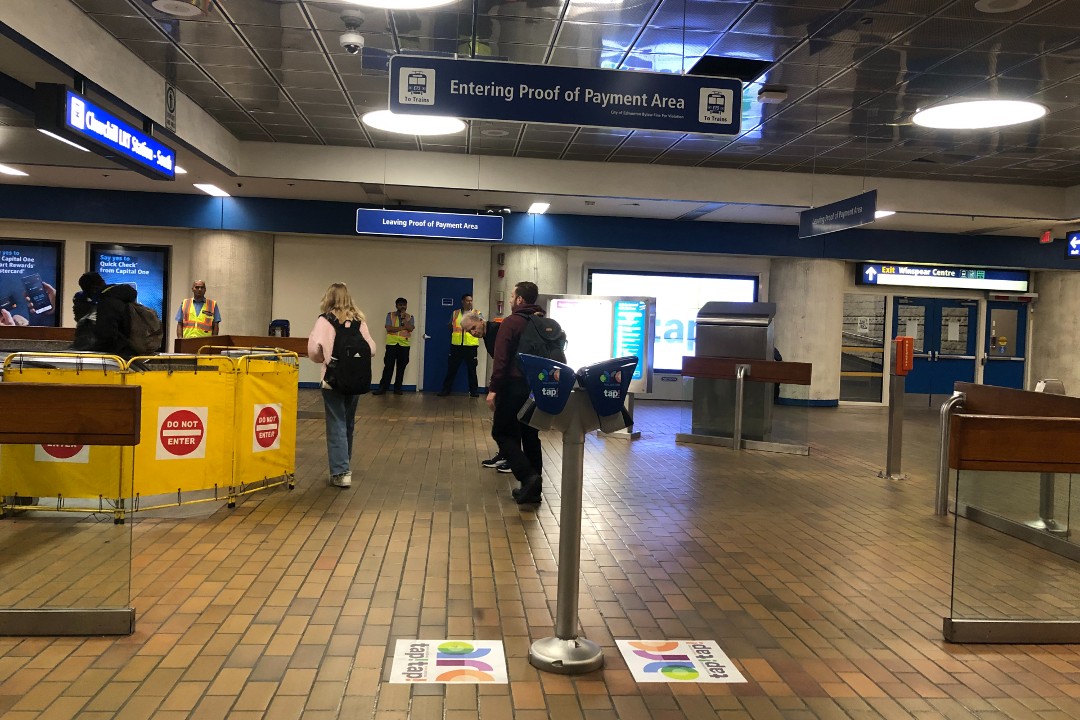A two-year pilot project that will cost more than $7 million to install and staff 30 fare gates at two stations on the Capital Line LRT system to increase perceptions of safety could be a waste of money, the co-hosts of Episode 277 of Speaking Municipally suggested.
"This is a ridiculous proposal," said co-host Mack Male, listing ways the project, in his view, is bound to come up short.
On Sept. 17, council's urban planning committee sent the pilot project, which includes installing fare gates at the Churchill and Belvedere LRT stations, to city council for a final decision.
Male's perspective is that the pilot has flaws that will make it difficult to determine if it achieves its goals. Those include how easy it will be to evade fares by using different stations, jumping over the gates, or tailgating a paying rider. Male also said the city estimates just 5% of riders evade fares, meaning the gates will not recover enough revenue to pay for the pilot's cost.
Co-host Troy Pavlek challenged whether fare evasion is what the project is even about. "A lot of people when they're talking about fare gates, really, it's coded language for, 'I don't want people who aren't professional commuters in my transit stations,'" he said.
Even on the security measure, both co-hosts suggested the pilot could involve much work for little result, as the fare gates will be located near train platforms rather than at station and pedway entrances. Both suggested the status quo may continue.
"It's going to be $7 million of wasted money that doesn't even get to the root of the problem that people in the city are concerned about," Pavlek said.
The co-hosts contrasted the pilot project with Stadium LRT station, which was recently rebuilt to change its design from partially underground and inaccessible to wide open and unrestricted.
"It's not a place where you feel unsafe because there's lots of people, lots of eyes on that station," Male said.
The station is built in a way that's "completely impervious to fare-gate installation," Pavlek noted, adding that it also feels safe and has spurred transit oriented development nearby. "It's a success story of exactly what we're trying to do by avoiding the fare gate style of transit."

Edmonton's LRT stations currently have proof of payment areas but no physical barriers to limit access. City council will soon consider if installing 30 fare gates at two stations over two years is a worthwhile investment. (Stephanie Swensrude)
Bike Index success
The co-hosts also discussed an Edmonton Police Service press release that noted the success of the Bike Index program, which is a partnership between the police and local bike shops. The police said the system has resulted in a staggering 146,000 bicycles being registered and $1 million in stolen bicycles being recovered over five years.
"When my bike was stolen it was recovered," Pavlek said, praising the index.
"It's an incredible number," Male added. "And what I loved about this news release ... is it wasn't the police saying, 'Look at how great we are,' but (instead) they really credited the partnership they have with the 20 local bike shops."
Cheering for ChargeStop
As Speaking Municipally listeners may know, Pavlek owns and drives an electric vehicle. The co-hosts were therefore keen to discuss the new ChargeStop station at 99 Street and Whyte Avenue, which Taproot reported on, and which is close to where Pavlek lives.
Pavlek said he sees spin-off benefits from the station, which offers Level 3 charging to fill batteries with electrons faster than the Level 1 or 2 chargers already in the city. Given its proximity to a nearby bus stop, Pavlek said he's seeing transit riders use the station for food, coffee, or connection.
"It has full meals ... that you can warm up. And I think this is the real interesting part about electrification of our transportation network," he said.
Because EV batteries take longer to replenish than a gas tank does, "you have to make these stations appealing to people to get out of their car, stretch their legs, enjoy the amenities," Pavlek continued. "In effect, you've now made any spot that could have been a gas station an amenity for anyone in the community."
There's much more in the Sept. 20 episode of Speaking Municipally, including a discussion about city council's decision to take no action on a request to remove councillors from the Edmonton Police Commission, a new provincial police oversight agency, council adopting financial disclosure rules, bike lane vandalism, Pavlek discovering eastern Canada, and a newsroom update from Taproot managing editor Tim Querengesser. Speaking Municipally comes out on Fridays at noon. Listening and subscription options are all right here.
